Contents
1690s in Canada |
| Other decades |
| 1670s | 1680s | 1690s | 1700 | 1701 |
| Part of a series on the |
| History of Canada |
|---|
 |
| Timeline (list) |
| Historically significant |
| Topics |
| By provinces and territories |
| Research |
Events from the 1690s in Canada.
1690s in Canada |
| Other decades |
| 1670s | 1680s | 1690s | 1700 | 1701 |
| Part of a series on the |
| History of Canada |
|---|
 |
| Timeline (list) |
| Historically significant |
| Topics |
| By provinces and territories |
| Research |
Events from the 1690s in Canada.

Queen Anne's War (1702–1713) was the second in a series of French and Indian Wars fought in North America involving the colonial empires of Great Britain, France, and Spain; it took place during the reign of Anne, Queen of Great Britain. In the United States, it is regarded as a standalone conflict under this name. Elsewhere it is usually viewed as the American theater of the War of the Spanish Succession. It is also known as the Third Indian War. In France it was known as the Second Intercolonial War.

The Peace of Ryswick, or Rijswijk, was a series of treaties signed in the Dutch city of Rijswijk between 20 September and 30 October 1697. They ended the 1688 to 1697 Nine Years' War between France and the Grand Alliance, which included the Dutch Republic and the Holy Roman Empire.

King William's War was the North American theater of the Nine Years' War (1688–1697), also known as the War of the Grand Alliance or the War of the League of Augsburg. It was the first of six colonial wars fought between New France and New England along with their respective Native allies before France ceded its remaining mainland territories in North America east of the Mississippi River in 1763.
This section of the timeline of United States history concerns events from before the lead up to the American Revolution.

Louis de Buade, Comte de Frontenac et de Palluau was a French soldier, courtier, and Governor General of New France in North America from 1672 to 1682, and again from 1689 to his death in 1698. He established a number of forts on the Great Lakes and engaged in a series of battles against the English and the Iroquois.
The Beaver Wars, also known as the Iroquois Wars or the French and Iroquois Wars were a series of conflicts fought intermittently during the 17th century in North America throughout the Saint Lawrence River valley in Canada and the lower Great Lakes region which pitted the Iroquois against the Hurons, northern Algonquians and their French allies. As a result of this conflict, the Iroquois destroyed several confederacies and tribes through warfare: the Hurons or Wendat, Erie, Neutral, Wenro, Petun, Susquehannock, Mohican and northern Algonquins whom they defeated and dispersed, some fleeing to neighboring peoples and others assimilated, routed, or killed.

This section of the Timeline of Quebec history concerns the events relating to the Quebec portion of New France between the establishment of the Sovereign Council and the fall of Quebec.

Events from the 1640s in Canada.

Events from the 1650s in Canada.

Events from the 1680s in Canada.

Events from the year 1702 in Canada.

Joseph Dudley was a colonial administrator, a native of Roxbury in Massachusetts Bay Colony, and the son of one of its founders. He had a leading role in the administration of the Dominion of New England (1686–1689), which was overthrown in the 1689 Boston revolt. He served briefly on the council of the Province of New York, from which he oversaw the trial which convicted Jacob Leisler, the ringleader of Leisler's Rebellion. He then spent eight years in England in the 1690s as Lieutenant-Governor of the Isle of Wight, including one year as a Member of Parliament for Newtown. In 1702, he returned to New England after being appointed governor of the Province of Massachusetts Bay and Province of New Hampshire, posts that he held until 1715.
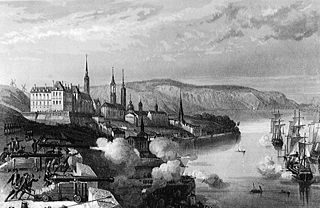
The Battle of Québec was fought in October 1690 between the colonies of New France and Massachusetts Bay, then ruled by the kingdoms of France and England, respectively. It was the first time Québec's defences were tested.
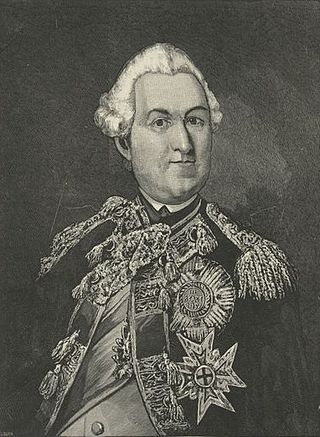
Richard Coote, 1st Earl of Bellomont, known as The Lord Coote between 1683–89, was an Irish nobleman and colonial administrator who represented Droitwich in the English Parliament from 1688 to 1695. He was a prominent Williamite, supporting William III and Mary II during the Glorious Revolution.
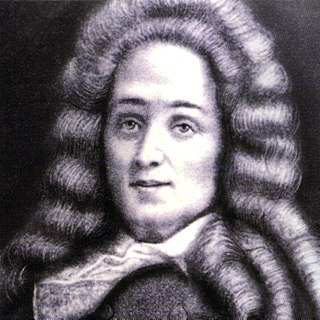
Louis-Hector de Callière or Callières was a French military officer, who was the governor of Montreal (1684–1699), and the 13th governor of New France from 1698 to 1703. During his tenure as governor of Montreal, the Iroquois war had enhanced the importance of that position. He conducted himself so well during this period that he was awarded the prestigious cross of Saint-Louis in 1694 partly under the recommendation of Buade de Frontenac. He, additionally, played an important role in defining the strategy that New France followed during Queen Anne's War. He ranked as captain in the regiment of Navarre. He came to Canada in 1684, and was appointed Governor of Montreal at the request of the Sulpicians who were Seigneurs of the island. The situation of the colony at that time was most critical, owing to Frontenac's departure, the weakness of Governor de la Barre, and the woeful error of the French government in sending some Iroquois chiefs captured at Cataracoui (Kingston) to be galley slaves in France.
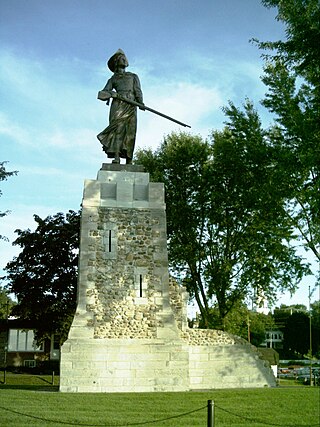
Marie-Madeleine Jarret, known as Madeleine de Verchères was a woman of New France credited with repelling a raid on Fort Verchères when she was 14 years old.
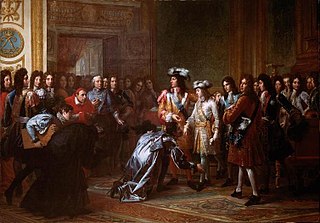
The Treaty of Den Haag, or Treaty of The Hague, was signed on 7 September 1701 between England, the Holy Roman Emperor Leopold I, and the United Provinces. It reconstituted the 1689 anti-French Grand Alliance in response to the issues that resulted in the War of the Spanish Succession.
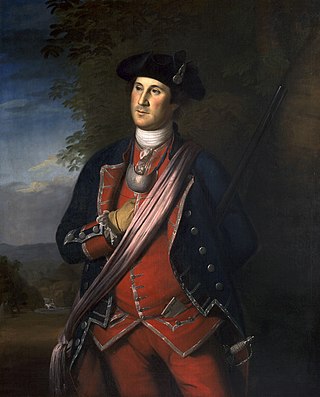
Colonial American military history is the military record of the Thirteen Colonies from their founding to the American Revolution in 1775.
Events from the year 1697 in France